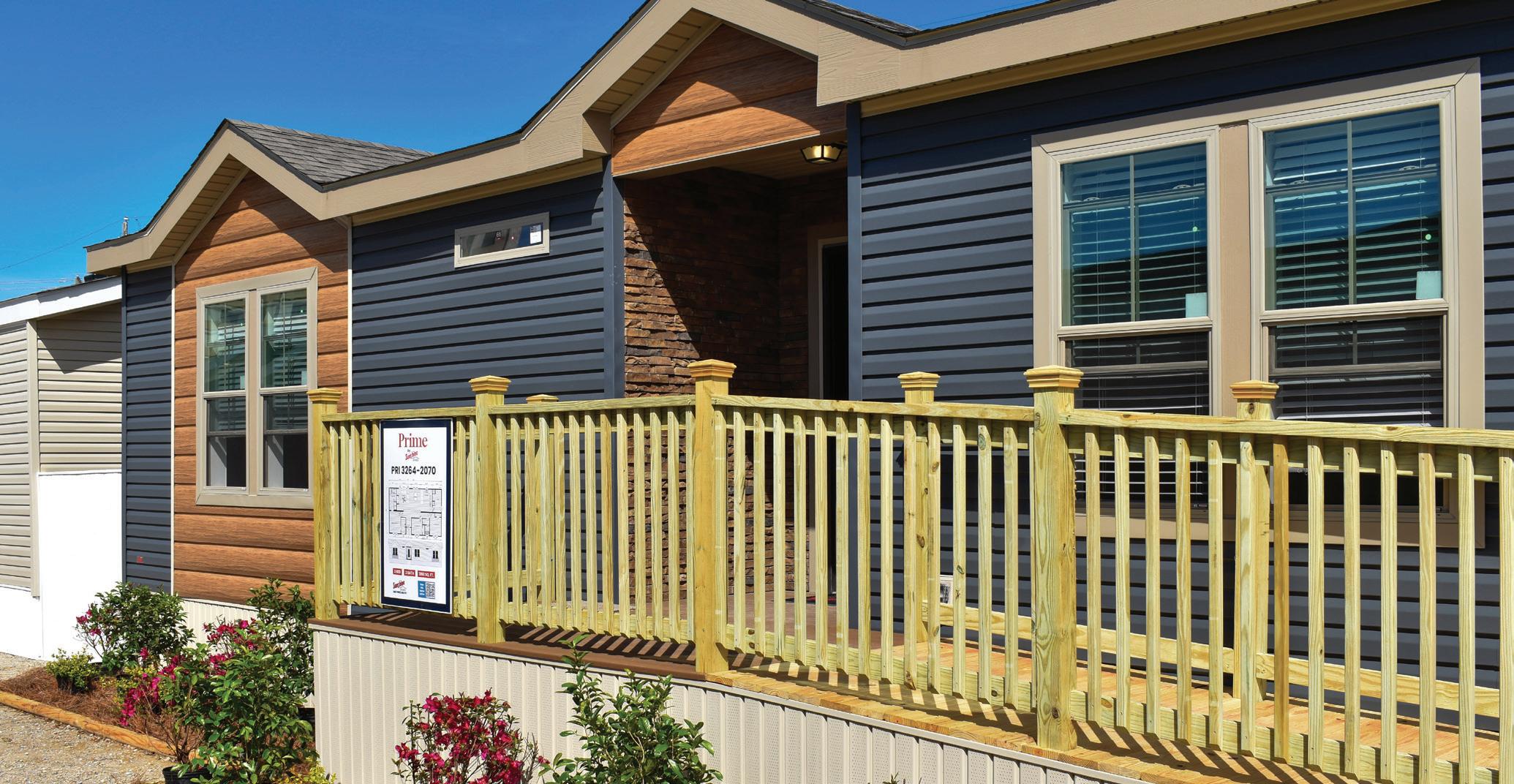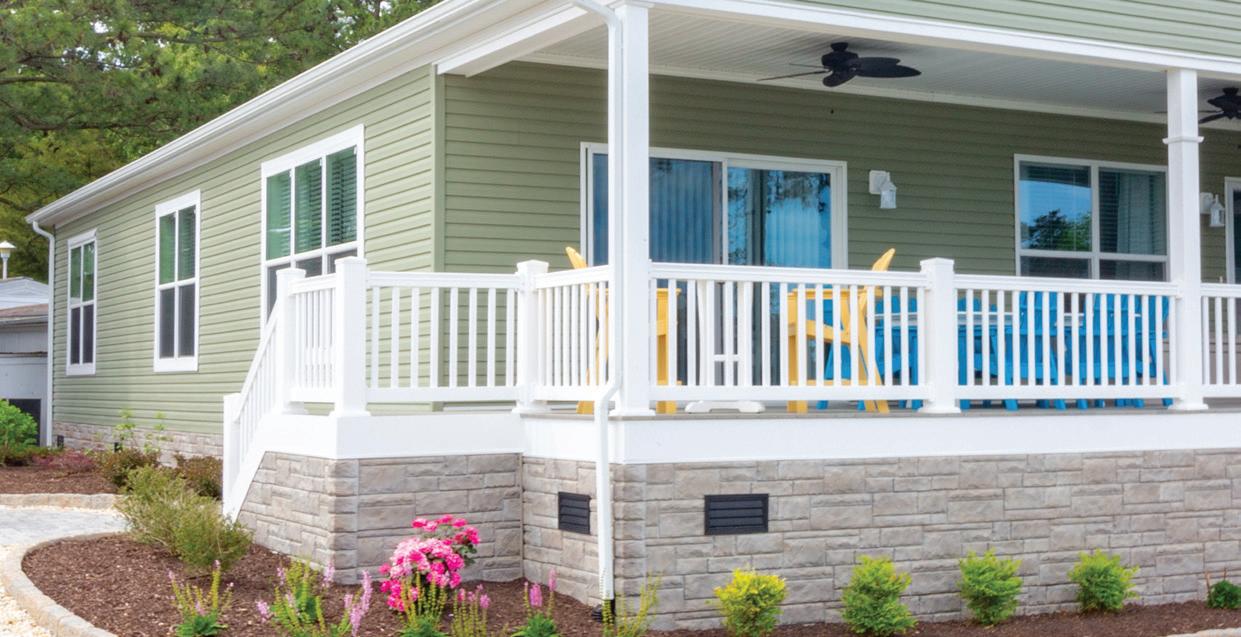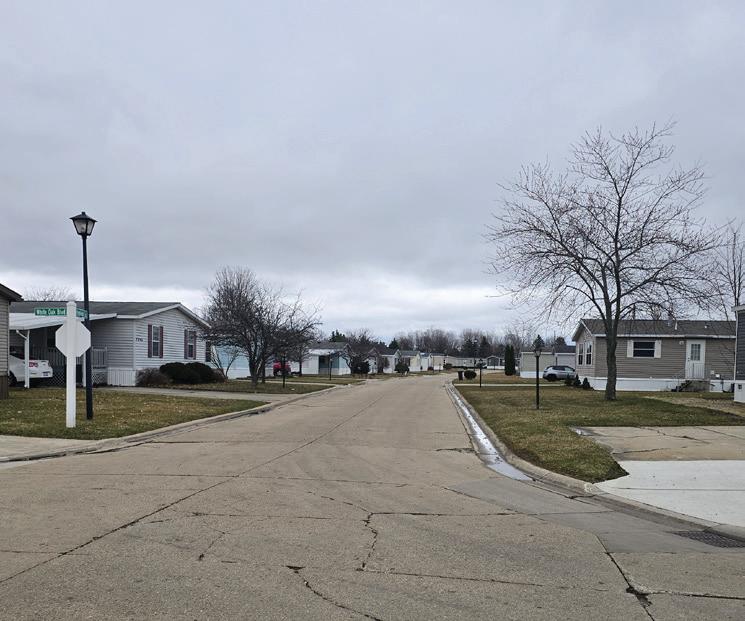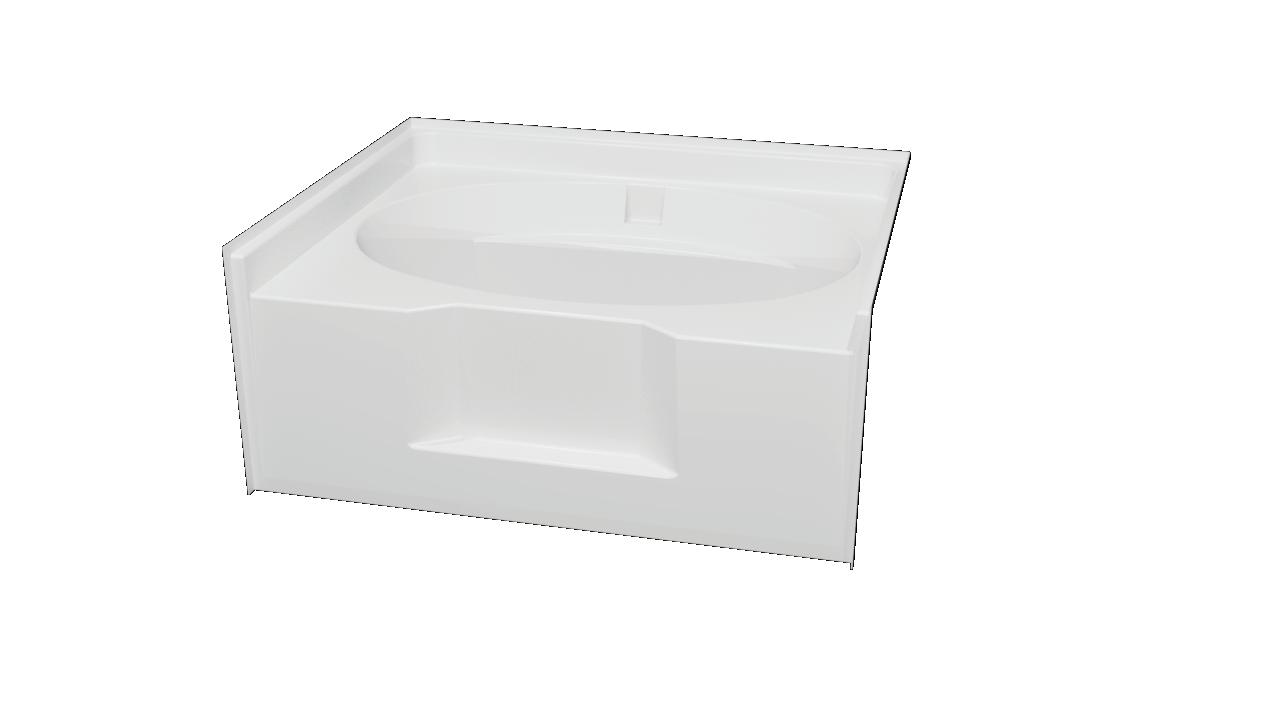

YOUR PARTNER, NOT JUST YOUR LENDER.
DESIGNED TO HELP YOU CLOSE MORE LOANS ZIPPYFAST!
• Focus your sales teams with lender qualified leads




• Communicate with your loan team online
• Enjoy a dedicated Community Guide to support your success


• Multiple lending options to accommodate every community strategy
• Bilingual services and ITIN lending





































































































































































PUBLISHER Patrick Revere | patrick@mhvillage.com
SENIOR GRAPHIC DESIGNER Merit Kathan | merit@mhvillage.com
CONTRIBUTING EDITOR George Allen | gfa7156@aol.com
COVER ART Mountain View-Park 1, oil on canvas by Marisa Murrow.
EDITORS Dawn Highhouse | dawn@mhvillage.com, Sean Vichinsky | sean@mhvillage.com
CONTRIBUTORS Ken Corbin, Suzanne Felber
ADVERTISING SALES (877) 406-0232 advertise@mhvillage.com
MANUFACTURED HOMES ARE ALL WE DO
When you need an appraisal on a new or pre-owned manufactured home, go with the time-tested experts on market-based comparable valuations since 1987.
At Datacomp, manufactured homes are our singular focus — and you won’t find more expertise, specialization, or reliability anywhere else.





from the publisher

Patrick Revere is vice president of communications at MHVillage and publisher for the MHInsider magazine and blogs. His background is in print news, language, and communication.
EMBRACECHANGE
There are all sort of wise words out there about how the only thing that stays the same is change, how to embrace change, and what change means for each of us, regardless of industry or occupation.
Whether on a video call or in conversation at a conference, the manufactured housing industry veterans of 25, 30, 40, or 50 years, talk readily about change, about how much different the industry is than “when”.
Well, from one publisher’s vantage, significant change does not take decades.
Now just a few years in the business, oh, has there been change. Not just consolidation, rebranding, and new blood. The changes are everywhere!
We have homes, fully marketed and for-sale homes, that didn’t even exist in the decade previous. Those homes meet customer demands for size, space, and function that had occurred to our designers and builders in recent years.
Change in the manufactured housing industry is important. It reminds
us that ideation and innovation can happen right before us. Much talk has been had among former MH or affordable housing advocates that we need to continue to push our offerings into the general housing conversation, and into the general housing market.
This is a fine idea to help reframe our business in the consumer’s eye. But let’s not forget, that we are smaller, and therefore more nimble. Like a small organization that can be versatile and make efforts to be “first to market” with a great idea, the manufactured housing industry should hold tightly to that idea, too. We have made rapid change, in what had been a difficult housing market even prior to the COVID pandemic, and we continue to work quickly, quicker than most.
The next time we sit with stakeholders, let’s remember to help those who are less familiar with the industry understand that we are quick each day with homes, and we can be quick, too, with the next great idea for housing as a whole. MHV
Have Industry News, Events, or Editorial Content You'd Like to Share?
Contact our Publisher, Patrick Revere at (616) 888-6994, or patrick@mhvillage.com


States where RHP currently own


• All Cash
• Highest Price Paid for MHCs
• 37 Years of Experience Buying
• Manufactured Home Communities
• of Every Size & Complexity
• 100% Confidential
• Comfortable with Private Utilities &
• Community Owned Homes
• Smooth & Efficient Closing Process
• Privately Owned & Operated
• Brokers Protected





MAINTENANCE
Take charge of your rental home maintenance projects—from creation to completion—with a streamlined, effective scheduling solution.
Rent Manager's comprehensive Maintenance Scheduling feature gets your rental projects across the finish line faster.

INDUSTRY
TRANSACTIONS
Georgia Community Sells for $8.2 Million
Dogwood Blossom, a manufactured home community in Douglasville, Georgia, has been sold by Forrest Street Partners to Regal Communities for $8.2 million. Forrest Street purchased the community in 2021 and had brought in nearly 70 new homes and has made improvements such as street and parking repaving, sewer enhancements, water line repairs, power and landscaping improvements, new community signage, and enhanced amenities.
Texas Community Purchased by DPG Investments
DPG Investments with its affiliate MHC Capital Advisors, LLC, and K8H Ventures, has structured $56.2 million in senior debt, mezzanine debt, and preferred equity for the acquisition and development of a 1,036-homesite manufactured home community in Terrell, Texas. Post Oak is the first of many acquisitions under the Benchmark name, with four more expected during the first half of 2025.
FG Buys Chapel Hill Community
FG Communities has purchased The Chapel Hill manufactured housing community on 23 acres and with 60 homesites. Growth in Chapel Hill, North Carolina, has created a large deficit in the amount of available affordable housing. The Chapel Hill manufactured housing community provides a much needed affordable option for residents. “The Chapel Hill manufactured
housing community is a welcome addition to our portfolio. This is a fast-growing area that is in need of affordable housing options. We believe continued growth in the area will have a positive impact on this community,” FG Communities CEO Michael Anise said.
RHP Picks Up Houston-area Community
Pecan Plantation, a manufactured home community in La Porte, Texas, near Houston, has been purchased by RHP Properties. The community features spacious home sites, two swimming pools, a playground, clubhouse, and gym. It is adjacent Pecan Park, a 34-acre public park with baseball and softball fields, batting cages, a pavilion, picnic areas, playground, and walking track. “Our goal is to provide residents with a high-quality environment that fosters comfort, convenience, and a strong sense of community,” RHP Properties CEO Ross Partrich said. “Our management team is committed to enhancing the living experience and creating a space where families and individuals can thrive and feel a true sense of belonging.”
Colorado Community Changes Hands
Denver Cascade, a Denver manufacturing home community with more than 380 homesites on 48 acres, has sold for $62 million. CBRE’s Manufactured Housing & RV Resorts team represented the seller in the deal. »






Unbelievable Price Points

















HUD’s OMHP Names New Contractor for Installation Program
The Office of Manufactured Housing Programs will have Tribal One administer the HUD installation program. During a transition stage, inquiries for the office can go to mhsinstallation@hud.gov.
PERSONNEL
Kaliber Names New Leadership
Brent Dudley has been named as the new president of Kaliber Management, a manufactured home community operator headquartered in Daphne, Alabama. The company manages more than 2,000 units across the southeastern United States, including campground and RV destination resorts.
Flagship Communities Appoints Two Trustees
Flagship Communities has appointed Candace McGraw and Jonathan Li to its board of trustees, the company said. McGraw is a prominent figure within the aviation industry, serving as the CEO of Cincinnati/Northern Kentucky International Airport and is the first female chair of ACI World. She has over 25 years of experience in legal affairs and public administration. Li is the president and CEO of Minto Apartment REIT, a TSX-listed owner and operator of high-quality multi-family rental properties in Canada’s major markets. He has 25 years with the REIT and as managing director in the real estate investment banking group at BMO Capital Markets.

INDUSTRY GIVING
Yes Builds on Community Programs
Yes Communities has provided more than $1.3 million during the last five years in community assistance funding to residents, team members, and charitable organizations. The program offers specialized initiatives such as We Build Community Paid Time Off, Paid Time Off Donation Program, Hug-A-Home, and Helping Hands Assistance. Each year, Yes Communities allocates approximately 11,000 paid volunteer hours for team members to give back to their communities. Through the We Build Community PTO program, all members receive paid time off to volunteer with local charities. We Care’s Hug-A-Home program has invested $240,000 to assist residents since 2018. In 2024 alone, team members volunteered to renovate 33 resident-owned homes, improving the lives of homeowners in need. “Our team members’ passion for giving back is what drives the success of YES We Care,” Yes CEO Steve Schaub said. “Their efforts make a meaningful difference in the lives of residents and in the communities we serve. It’s inspiring to see the positive impact we create together, year after year.”
IN MEMORIAM
Industry Mourns Loss of ‘Legendary Dealmaker’
The Inland Real Estate Group executive Joseph Cosenza passed away in late 2024 at the age of 81. Mr. Cosenza, a native of Chicago, formed Inland with two partners in 1968. They built one of the nation’s largest commercial real estate and finance groups. As head of acquisitions for Inland, Mr. Cosenza oversaw and consulted or negotiated the purchase of more than $55 billion of commercial real estate. “Joe was a legendary deal maker in the commercial real estate industry, a trusted and valued partner, and a dear friend,” Robert H. Baum, Inland chairman, co-founder and general counsel, said. “We will miss his enduring loyalty, high energy and passion, particularly when he was on the acquisition front fighting the good fight to acquire real estate on terms most favorable to Inland and our investors.” MHV


May 5 – 7, 2025
Rosen Shingle Creek, Orlando, FL






DON’T MISS OUT ON THREE DAYS OF:
• Educational sessions taught by industry experts and leaders in the field
• Networking opportunities with over 1,500 attendees
• 160+ exhibit booths and companies to explore
• Dynamic mainstage speakers
2025 ENHANCED EVENT FEATURES:
• Return of the MHI Neighborhood – an outdoor exhibit featuring an extended home display
• MHI’s Learning Lab – a studio on the Expo Hall floor featuring sessions hosted by key exhibitors
• 12 educational workshops in tracks tailored to your interests – Industry Hot Topics, Newcomers, Networking Roundtables – NEW
BECOME AN EXHIBITOR:
• Maximize your visibility
• Limited spots remain
• Booths start at $999
Builders Poised to Aid in Fire Recovery

Most estimates on the catastrophic damage from the fires in Southern California place the loss of residential structures at 16,000, the number of displaced people at approximately 80,000, and the cost of recovery in the billions of dollars.
Even in late January, small sections of more than 300 blazes had garnered more than 48,000 emergency calls, and the loss of life was estimated at 28.
In mid-January, California Gov. Gavin Newsom’s office put builders and retailers on notice about how off-site built structures would play into the recovery.
“As thousands of Los Angeles residents have been faced with sudden displacement, the state is taking decisive action to help provide housing and assistance as quickly as possible,” Gov. Newsom said with the release of his Jan. 16 executive order. “We are expediting the creation of new temporary housing by removing roadblocks and strengthening protections.”
Among the half dozen areas of relief for people displaced by the wildfires were three that directly impact the manufactured housing and RV industries.
• Streamline construction and occupancy of accessory dwelling units (ADUs) on properties destroyed by
the fires, including extending CEQA and Coastal Act exemptions.
• Make it easier to place temporary trailers and other housing on property while the destroyed or damaged residence is rebuilt.
• Suspend fees for mobile home parks under the Mobilehome Park Act,
Discover the Credit Human difference
Special Occupancy Parks Act, and Manufactured Housing Act for the next three years.
Each of the largest builders in the manufactured housing industry have factories, including in the western states, that build ADUs, park model RVs, and a variety of manufactured homes. MHV
Where we’re committed to:
Making a complex process smooth and simple.
Crafting lending programs with your needs in mind.
Improving the lives of the people we serve.

Visit our booth at the Biloxi Show to learn more and enter to win our giveaway!
For program information or questions, contact us at: MHinfo@CreditHuman.com
HALL AWAITS 2025 CLASS
In August, the RV/MH Hall of Fame will celebrate the 2025 class of inductees, five from each industry.


“Our selection committees held meetings to review in detail all the nominations submitted for consideration of induction in the 2025 class of the RV/MH Heritage Foundation’s Hall of Fame,” outgoing Hall of Fame President Darryl Searer said. “The committees were impressed with the number and quality of nominations.”
The following individuals have accepted the Hall of Fame’s invitation to attend the 53rd annual induction ceremony. This gala event will take place at the Heritage Foundation museum and conference facility in Elkhart, Indiana, on Aug. 18.

Manufactured Housing Inductees

Kurt Kelley — Texas-based Insurance Provider
Mobile Insurance
Kurt Kelley, who was nominated by Spencer Roane, of SECO and Pentagon Properties, has worked at Mobile Insurance since 1991, has owned the business since 1998, and insures hundreds of manufactured home communities nationwide. He is a board-certified attorney, co-founder and managing member of the American Insurance Alliance, a community owner, founder and operator of the annual TexCo conference in Woodlands, Texas, and is the founder and publisher of Manufactured Housing Review. “Kurt Kelley is a valuable presence in Texas and throughout the U.S.,” former community owner/event organizer/industry writer George Allen said in a letter of support for Kelley’s nomination.


Bill W. Poynter — Kentucky Manufacturer and Retailer
Guerdon Industries/Great American Homes and The Affordable Housing Mart
Bill Poynter, who was nominated by former Kentucky Manufactured Housing Institute Executive Director Betty Whittaker, dedicated 34 years of his professional life to the RV and manufactured housing industries. He gave enumerable hours to the KMHI, the state certification and licensure board, and the Manufactured Housing Institute. “Bill was instrumental in the early development of regulations for the industry, as well as amendments to the laws and regulation,” Whittaker said. Poynter passed away in 2006.
Mark Raukar — Michigan Manufactured Home Retailer
Little Valley Homes
Mark Raukar, who was nominated by John Lindley, president of the Michigan Manufactured Housing Association, began working at Little Valley Homes in 1987 as a young man who was interested in helping run the family business, founded by father Matt Raukar and his uncle Ed Raukar. In addition to operating the retail business, which he has owned and operated since 2004, Raukar owns and operates six manufactured home communities in the state. He has volunteered time with the state association in Michigan, had been a longstanding member of the Michigan Manufactured Housing Commission, and has worked with MHI, and other groups. “Mark is always ready when asked and will go out of his way to make sure he can help to answer questions, give his expert opinion, or be present whenever there is an industry cause,” Lindley stated in his nomination remarks.

Manufactured Housing Inductees

Steve Schaub — Colorado-based Community Executive Yes Communities
Steve Schaub, who was nominated by longtime colleague Karen Hamilton, has worked in the industry for more than 30 years and since 2017 has been president and CEO of Yes Communities, growing one of the nation’s largest portfolios of land-lease communities from 178 to nearly 300 communities. He founded and operated BaseCamp Capital from 2003 to 2017, has served as chairman for the National Communities Council, vice chair of the Urban Land Institute, and was recognized in 2019 as one of the Top 100 Business Entrepreneurs by Goldman Sachs. “Steve’s understanding of market shifts, regulatory environments, and customer needs has been instrumental in driving significant growth and innovation,” Clayton President Kevin Clayton stated in a letter of support for Schaub’s nomination.

Nelson Steiner — Florida-based Community Owner Steiner Communities
Nelson Steiner, who was nominated by Florida Manufactured Housing Association CEO Jim Ayotte, worked in the manufactured housing industry for more than five decades, leading Tampa’s Steiner Communities since the 1970s, starting with Fountain View Estates, a 546-homesite 55+ property. He also ran Park Place Housing Sales Centers, and received MHI’s Community of the Year award in 2005 for Windward Knoll in Thonotosassa, Florida. He gave countless hours to state and national trade associations, and was noted for “selfless contributions and strong character and charm” according to Ayotte’s nomination statement. “Nelson is a pure entrepreneur. To build a successful manufactured home community business from the ground up is a daunting challenge,” Murex Properties President Steve Adler said in support of Steiner’s nomination. “The developments that Nelson has built here in Florida were state of the art and continue to provide quality housing and lifestyles to many retired families.”
RV Industry Inductees
Garry Bewernick – Distributor • Atlas Trailer | Chestermere, Alberta, CA
Thomas Irons – OEM / Supplier • ASA Electronics | Middlebury, Indiana
Jason Lippert – Supplier • Lippert Components | Elkhart, Indiana
Chad Reece – Manufacturer • Winnebago | Forest City, Iowa
Larry Trout – Dealer • Toppers RVs | Waller, Texas

TURNKEY MANUFACTURED HOME SERVICES
We are a one-stop for all your home installation and site development needs. We have a well established reputation for integrity, service, experience and the ability to complete complex projects. As a result, we’ve become the company of choice of many federal and state agencies and private clients. Regardless of the project or situation, our core focus is...
Site Development
Infrastructure
Roadway
Water
Sanitary Sewer
Storm Sewer
Electrical
Curb & Gutter
Community Expansion
Site Inspection
Permitting
Site Prep
Turnkey Installation
• Utility Connections
• Skirting
• Block, Level, Tie, Steps, and Ramps
• Awnings
• Carports
• Parking Pad





Painter of the Palisades
REFLECTS ON HER HOME, HER WORK
By Patrick Revere


Southern California is a draw for many reasons, and longtime residents of the region have many stories to tell about the beauty and quality of life that surrounds them.
For Marisa Murrow, a painter, her life of travel and artistic creation led her back to the place where she was raised, a place where she would find a new appreciation for those formative years and new vision for her artistic endeavors.
In recent years, she has consistently painted an unlikely subject matter, she said; mobile home parks.
“The series is as much about the homes as painting itself,” Murrow told her audience at a recent meeting of the Western Manufactured Housing Communities Association (WMA).
“I find the subject matter keeps me curious and challenged as an artist. I am very attracted to the idea of community and the sameness of these particular structures,” Murrow said. “They are a metaphorical celebration of human connectivity. To get to know someone beyond the surface, we need to go inside: a place where we are all ‘decorated differently’ by the experiences we have.”
Maria Horton, from Newport Pacific, was among the attendees at the annual meeting late last year, and struck up a conversation with the artist.
“My first thought was related to the beauty of her work,” Horton said. “I had seen these locations years before and was surprised by how they stood out in Marisa’s work.”
The beauty of these manufactured home communities — Tahitian Terrace, Palisades Bowl, and Malibu Village — were captured in her paintings, so colorful and bright, Horton said.
Paintings Gain Increased Importance
Murrow is native to Pacific Palisades, where she painted in the open air, a studio that is equally as appealing as the work that comes to life there.

“Taking notice of the slipping hillside after the rains, I sometimes wondered if there would be a massive mudslide in the park,” Murrow said. “Never in my wildest dreams did I think this beautiful community right next to the Pacific Ocean would catch fire.”
All three communities Murrow painted were lost to the fire, all the coastal homes she represented in her paintings among the 18,000 lost and in need of replacement.
These tight-knit coastal communities are a place where people share common ground. She grew up in those hills overlooking the water — she and her neighbors swam in each other’s pools, sold lemonade on the corners, and walked to school together.
Murrow said curiosity and a good challenge typically are motivation toward making art. But the loss of place that shaped her, that inspired her, is devastating.
“The beaches and roads are closed indefinitely from the Palisades through a long stretch of Malibu,” Murrow said. “Unable to pick up a paint brush in this moment, I found solace in volunteering at an evacuation center near my studio.”
Through this process, a purpose presented itself. With donated flowers and experience as a professional floral designer, Murrow began making arrangements on a bi-weekly basis to bring some cheer to the recreation centers and other places residents in need are being sent.
Artists don’t just create — they connect, they heal, they help others see in ways we didn’t know we needed, she said.
“Creativity carries people through. I have come to realize, when things fall apart, it is healing to get to work, reach out,” Murrow said. “Give. Because in the giving, we get back what we thought we lost.” MHV



Building More Opportunities for Manufactured Housing
Updated HUD standards for energy-saving appliances include propane-powered tankless water heaters, a change that allows manufacturers to make factory-installed options available to homebuyers. From kitchen ranges to water and space heating systems, the enhanced e ciency of propane appliances provides homeowners and tenants with a ordable comfort while making your next build even more profitable.
Learn why builders, manufactured housing retailers, and community owners prefer propane at propane.com/manufacturedhousing







EVENTS & TRADE SHOWS
If you have an event or gathering you would like to have listed with MHInsider, please
scan the QR code below:

BILOXI MANUFACTURED HOUSING SHOW
Monday, March 17 — Wednesday, March 19, 2025
Biloxi, Miss. • IP Casino Resort and Spa
The South Central Manufactured Housing Institute each year hosts the Biloxi Show for manufactured housing professionals. It is North America’s largest indoor/outdoor manufactured home trade show, featuring an outdoor village with nearly 50 homes on display, an impressive indoor exhibit hall that showcases the newest features from industry suppliers, as well as educational training to help build a business.
IMN MANUFACTURED HOUSING FORUM
Monday, April 7 — Tuesday, April 8, 2025
La Jolla, Calif. (San Diego) • Hyatt Regency at Aventine
Manufactured Housing Forum from Information Management Network will provide exclusive educational content and industry insights, but also presents a unique opportunity for senior-level attendees to meet with owners, investors, developers, lenders, builders, and more. The program will feature discussions on all aspects of the industry including modular, pre-fab, and community operations.
MHI CONGRESS & EXPO
Monday, May 5 — Wednesday, May 7, 2025
Orlando, Fla. • Rosen Shingle Creek Resort
The national trade show where manufactured housing professionals can obtain the knowledge and resources necessary to excel in today’s housing marketplace. Attend top-quality educational programs with powerful speakers, engage with the industry’s most successful professionals, and visit the exhibit floor to see the latest products and technologies.




THE BILOXI SHOW TAKES CENTER STAGE
The Biloxi Manufactured Housing Show and Expo is now in its fourth year, and has cemented itself as a primary attraction for industry professionals looking to keep up on the latest in new home offerings.
Held March 17-19 at the IP Casino Resort, The Biloxi Show will feature homes from 16 brands — including several manufacturers that will have offerings from multiple home building locations.
Attendees can expect about 50 homes to tour, as well as nearly 100 service and supply exhibitors from all parts of the industry including lenders, product suppliers, insurance providers, agency and software offerings, and transport and setup professionals to engage with on the expo floor.
“We’re excited about the Biloxi Show,” Boo Haughton of Regional Builders Group said. “We’ve got some new product that will be there. We are going to bring a double wide, a new single wide, and then a concept house.
“The Biloxi Show means a lot to every manufacturer in North Alabama, especially us,” he said. “We get to display everything new, new product line, new color choices, new everything.”
Featured speakers include Theresa Payne, deputy assistant secretary at HUD, and Mike Price, the senior policy analyst from FHFA on industry progress and vision. MHI CEO Lesli Gooch and President Mark Bowersox will review 2024 and provide a state of the industry discussion, and MHVillage’s Darren Krolewski will cover effective social media strategies.
“2025 will be the best year yet in Biloxi, the mix of homes, the number of exhibitors and the quality of educational sessions with expert speakers will provide a great experience for anyone who attends,” Mississippi Manufactured Housing Association Executive Director Jennifer Hall said.
MMHA works with the Alabama Manufactured Housing Association each year to host the event.
In addition to the many attendees and exhibitors at the show, the associations each year coordinate on a plan to host public
officials from the area, providing insight for those stakeholders in elected seats or policy positions.
“Each time we host a group of public officials, the reaction we get is the same. There is always that ‘Wow’ factor, and the amazement of what we can do with our homes,” Hall said. “We hear a lot of our public officials say ‘I had no idea you could get these features in a manufactured home’, and that’s what we’re looking to accomplish. We need people to see our industry’s capabilities, and when they do, they become fans. They advocate for us.” MHV





MANUFACTURERS
Avery Cabin Company
Champion
Chariot Eagle
Clayton
Destiny Homes
Fleetwood
Franklin Homes
KABCO Builders
Legacy Housing
Live Oak Homes
New South Quality Homes
Palm Harbor
Regional Builders Group
Sunshine Homes
Timber Creek Housing
TRU

Manufactured Home Community Financing


THERE’S AN EASIER WAY TO FIND ACQUISITION OPPORTUNITIES
With detailed rent, occupancy and community attributes for nearly 200 markets nationwide, Datacomp has the information the manufactured housing industry relies on to locate and evaluate opportunities. Get the insights you need in today’s competitive market and continue to grow your portfolio with confidence.

The Louisville Manufactured Housing Show in 2025 Deemed a Resounding Success
By Sean Vichinsky
It was a stellar year in Louisville, with more than 4,200 manufactured housing professionals making their way to the Kentucky Exposition Center for the annual kickoff to the event and sales season. The show in 2025 was the second year for the event under the show management of MHVillage.
Nearly 50 homes, 200 booth spaces and all of those attendees filling an expo hall that had expanded for the industry for the first time in decades.
“The show is the best I have seen in attending for over 25 years,” Assurant National Sales Director John Loucks said. “It was a great way to start the year in the industry, with all aspects of the industry being represented.”
Improvements to the show in 2025 included an expanded shuttle service, an optional VIP experience, a Thursday night music show, an eclectic array of food trucks on the expo floor, and added floor space for more homes and exhibitors.
Shawn Carnahan, general sales manager for Adventure Homes, said there was a steady influx of attendees in the homes Wednesday and Thursday of the show, and that he was grateful for all of the industry professionals who traveled to Louisville.
“Our dealer base has seemed to be very receptive to all of the changes made to the show this year, and are already talking about 2026,” Carnahan said. “And food trucks are always a hit.”
Bryan Cordill is the director of residential business development for the Propane Education and Research Council.
“Attendance was great and as engaged as we have seen,” Cordill said. “The additional display homes and exhibit space gave everyone room to move around and still allow for visits to the supplier booths.
“The food trucks and other customer experience features were a welcome update and I think the show is poised for many years of growth and success,” he said.
Ben Halliday, CEO and co-founder of Zippy, said The Louisville Show was an inspiring experience.
“Touring absolutely beautiful homes reinforced to me how incredible and important this industry is,” Halliday said. “The exciting buzz the show homes produced transcended to insightful and rewarding conversations. I left confident in our future and with a long list of new work to do!” MHV






















By Patrick Revere
CHAMPION CONSTRUCTION SERVICES AIMS TO ADD VALUE THROUGH ONE-STOPSHOP APPROACH FOR COMMUNITIES
By Patrick Revere
What began as a regional effort to help Champion Homes retailers in Pennsylvania and the Northeastern U.S. has expanded into a new business unit called Champion Construction Services. It’s already operating throughout much of the Midwest and Eastern U.S. and may expand nationally.
CCS, which is a part of Champion Homes, offers owners and operators of manufactured housing communities and retailers a service to set and finish homes on-site. As an extension of Champion Homes, CCS provides on-site completion that can ease the weight of infill on community managers. Customers receive a valuable turn-key service including the homes that Champion builds and the set-and-finish services that CCS provides.
“This all started with a vision from the Champion executive management team,” said Stephen Ryan, vice president of Champion Construction Services. “After a year or so, Terrence Andros and I were brought in to lead the business unit.”
Andros, director of business development at Champion Construction Services, said that both he and Ryan have a background in the community side of the business. They have more than 40 years of combined experience in asset management, operations, and inventory management.
“The communities we’ve worked with wanted a single point of contact – someone who would set up the home from beginning to end,” Andros said. “Champion saw that we could develop this service. We do the setting and finishing of homes, and we create value through offering faster speed-to-market performance for our customers.”
Andros noted that CCS’s goal is to complete a set within a designated amount of time after the homes are delivered.
“The idea is to reduce the time the community spends waiting on completion of the homes. Sometimes communities can have homes sitting for many months or even a year unfinished, which shouldn’t happen,” Andros said. “We aim to complete homes in 45-60 days depending on scope of work. What sets us apart is the improved speed-to-market performance we offer in getting the home ready for occupancy. With greater speed-to-market efficiency, community groups can offer more inventory for sale.”
In addition to its home-setting line of business, CCS offers a site evaluation service where the team will examine vacant infill sites to determine a buildable envelope, take measurements, note any obstructions or encroachments, and locate utilities for customers. The team also researches setbacks at the local municipality. »
“We offer a one-stop shop service, and we aim to provide a seamless experience from the time the home is purchased to when the Certificate of Occupancy is issued,”
—Stephen Ryan, vice president
of Champion Construction Services
“The customer buys a home from Champion, and the construction phase occurs in the Champion manufacturing facility. Then, the job is completed on-site with CCS. The customer works with Champion for all these steps in the homebuying process, and that communication within the Champion family is vital.”

Operate Quickly, Communicate Well
CCS is looking to scale. The business unit already operates in Florida, Georgia, North Carolina, South Carolina, Pennsylvania, Maryland, Delaware, Connecticut, New York, New Jersey, Maine, Wisconsin, Minnesota, Indiana, Ohio, Michigan, Illinois, Missouri, Minnesota, Iowa, Kansas, Arkansas, and Alabama. There are plans to expand into Kentucky, Texas, and Colorado, as well.
“There are a lot of new community groups that have entered the business in the last 10 years, and when they see the one-stopshop service we offer, they’re often really excited,” Ryan said. “We’re seeing a lot of interest in the continuity we can provide with Champion Homes for manufacturing and CCS for setup.”
Prioritizing strong communication, CCS aims to serve as an extension of the customer’s management team. CCS recognizes the opportunity to help community managers and wants to ease their workload so they can focus on their core business — fulfilling their residents’ needs and bringing in new community members.
As an example of CCS’s streamlined approach, they use a scheduling management program to help simplify the process of planning tasks and tracking workflows.
“We offer a one-stop shop service, and we aim to provide a seamless experience from the time the home is purchased to when the Certificate of Occupancy is issued,” Ryan said. “The customer buys a home from Champion, and the construction phase occurs in the Champion manufacturing facility. Then, the job is completed on-site with CCS. The customer works
with Champion for all these steps in the homebuying process, and that communication within the Champion family is vital.”
Carry-Through Experience
A contract is signed with CCS for homesite preparation and setup when the customer orders a house. While the home is being built at the Champion factory, CCS acquires permits, builds the pad, and organizes any on-site needs. The house is then delivered to the prepared site and CCS completes the set, interior finish, electrical, plumbing, AC, and any exterior packages like a carport or garage.
Ryan explained that CCS will help facilitate factory service so small service items don’t delay the house becoming a home for end customers. This important offering addresses a pain point that community owners often experience.
“The customer really benefits from the management and product experience we bring,” Ryan said. “And a major advantage of working with us is the existing relationships we have with our internal team at the factory.”
Andros emphasized the unseen value that CCS can provide for community managers. By serving as an extension of the community management organization, CCS can save them a significant amount of time and money, he said.
“When they work with us for turn-key services, they can have a single point of contact, one contract, and one check. When they compare that to the cost of doing it themselves — including managing multiple sub-contractors, insurances, and issuing multiple AP requirements — they can see the value we provide,” Andros said. “Instead of the community having to hire millions of dollars in resources to build a team, we’re their single point of contact. At that point, we handle the paperwork and project management, so they don’t have to do it themselves.”
The ultimate result can be a more effective business model because the set-up provider and the factory are in direct communication, providing significant benefits as a byproduct of this internal relationship, Andros said.
“We can identify opportunities for making the setting and finishing experience even better, communicate them to the factory, and make changes that can help elevate the industry as a whole,” Andros said. “The result can be a better build quality coming out of the factory and a better overall product for the industry.” MHV













RETAILER Q&A with Freedom Homes of Pearl

Each year in the spring, MHInsider works with a group of manufactured home retailers to help readers get a feel for the marketplace; what’s selling, who’s buying, what type of volume are you experiencing, how much are higher rates affecting your business, what trends do you notice in most desired home features? This year, MHInsider is working with Home Center General Manager Joshua Mcgee.
The questions are abundant. Let’s start with some basics…
How long have you been operating?
I have been in the industry for 11 years serving the Central Mississippi market. I worked in sales for over 10 and a half years before transitioning into my current role as general manager at Freedom Homes of Pearl six months ago.

Is the average home you sell increasing in size, getting smaller, or staying about the same?
The average home size has remained consistent throughout my time in the industry. I’ve seen most homes range between 1,200 and 1,500 square feet.
How many homes do you sell annually?
On average, we sell between 70 and 90 homes per year. This number has remained relatively stable over the years but can fluctuate based on market conditions, interest rates, and customer budget preferences.
What is your average time from the order of the home to set up?
We keep our best-selling floor plans in stock to help reduce wait times. If a home is readily available, delivery can happen within days. For homes that need to be ordered, the process from delivery to setup typically takes five to eight weeks, assuming the site is prepared in advance. It’s important to remember that there are several factors that can influence the schedule.
What is the most common add-on feature in your market?
Site improvements are the most requested add-ons, including power, septic systems, water connections, and land clearing. Additionally, the Generac home generator is a popular option in our market due to frequent weather-related power outages.
How have you seen your business evolve over the last few years?
With the rising cost of living, customers are increasingly interested in affordable high-quality home options. Both nationally and locally, the growing housing shortage has made it more important than ever to innovate to meet our customers’ needs — and modern manufactured homes are positioned to help increase the supply of new, attainable homes.
Many buyers are starting to notice the quality and efficiency of today’s modern manufactured homes. For example, our energy-efficient homes include features like an ecobee® smart thermostat, Lux low-e windows, Shaw® carpets and more, helping homeowners significantly reduce utility costs and making homeownership more affordable over the life of the home.

We keep our best-selling floor plans in stock to help reduce wait times. If a home is readily available, delivery can happen within days.
What do you think is the greatest challenge facing the industry right now?
For potential home buyers, affordability remains a top concern as the cost of living continues to rise. As an industry, stigma and zoning continue to be two of our biggest challenges. For instance, the city of Jackson had a moratorium for over 20 years on manufactured homes within city limits. Recently, because of rising housing prices, city officials have lifted those restrictions and now allow manufactured homes in certain areas. This is a positive step toward addressing housing shortages and providing more affordable options for buyers.
Are there specific strategies you’ve identified to keep homes moving?
We closely monitor market trends and customer preferences to ensure we always have the right inventory on hand.
What customer trends do you see in terms of use-ofspace and/or lifestyle amenities/materials choices?
With people spending more time at home, we’ve seen growing popularity with our flex spaces, which are versatile multi-purpose rooms that can be used as an office space, exercise room, game room or anything else that suits the homeowner’s needs. Having adaptable living spaces ensures that our homes accommodate changing lifestyles and evolving buyer preferences.
Why do you feel it’s important to attend events like Louisville, Biloxi, Congress and Expo and others?
I’m especially excited to attend the Biloxi Home Show this Spring – it’ll be my first time going. Industry events like these provide an important opportunity to seek inspiration from other builders, be introduced to new possibilities, and connect with other leaders in the industry. MHV

CONSTRUCTION LENDING
Built for Builders and Manufacturers
Comprehensive Lending
From one-time close loans to specialized financing for unique property types— including manufactured, modular, and alternative housing—we support your vision at every stage.
Streamlined Processes
A proprietary mortgage platform, Octane®, streamlines the mortgage process with automation to maximize partnership efficiency.
Industry Leadership
Backed by strong executive relationships with Fannie Mae and Freddie Mac, our leadership drives market evolution, positioning our partners at the forefront of opportunity.





WITH AN EXPERIENCE
Built for Borrowers
Tailored Loan Solutions
Homeownership isn’t one-size-fits-all. That’s why we offer a diverse range of lending options designed to meet unique financial needs, making homeownership more attainable.
Fewer Barriers to Financing
From one-time close construction loans utilizing FHA, VA, or Fannie Mae programs to flexible credit terms and low down payment options, we provide borrowers with financing solutions that fit their path to homeownership.
Smarter Home Loan Experience
Powered by Octane ®, a proprietary mortgage platform, we automate 90% of the process— streamlining approvals, reducing paperwork, and helping borrowers close faster with less hassle.
Expertise Across Home Types
With deep experience in off-site construction financing, we provide lending solutions for a wide range of property types, including manufactured and modular homes, barndominiums, tiny homes, and community developments featuring these home types.
Contact us to learn more about how Cardinal Financial can elevate your construction lending experience.

Oak Creek Homes Partners with LG Goal is to ‘Redefine Affordable Luxury’
By Suzanne Felber
Oak Creek Homes, a manufacturer of manufactured and modular homes, is partnering with LG, the top appliance brand in the U.S.
In 2025, every newly ordered Oak Creek home will come equipped with premium LG stainless steel kitchen appliances, with an option to add a top-rated washer and dryer.
Affordable luxury is a trend that we are seeing in all areas, including kitchens and baths. Consumers are starting to ask for better, energy efficient appliance packages in their homes that are well designed, and reliable. With grocery prices rising, having

a refrigerator that will help produce and refrigerated items last longer is a feature that is sought after now more than ever. It is exciting to see brands such as LG understanding the value that our homes provide, and partnering with companies such as Oak Creek Homes.
LG has been recognized by Consumer Reports as America's most reliable appliance brand. Its high-performance products are designed to elevate the everyday living experience in Oak Creek's homes. The partnership enhances the aesthetic appeal
of Oak Creek homes and guarantees reliability and longevity for every homeowner.
The collaboration blends affordable luxury with cutting-edge technology, unmatched convenience, and style. LG’s ENERGY STAR® certified appliances — including refrigerators, dishwashers, ovens, and laundry systems — perfectly complement Oak Creek's award-winning homes, enhancing both functionality and elegance.
Key Features of LG Appliances in Oak Creek Homes
Refrigerators: LG ENERGY STAR® refrigerators feature the exclusive Linear Compressor, offering quiet operation and improved efficiency. Select Oak Creek homes feature the InstaView® Knock Twice Refrigerator, letting you peek inside, preserving cold air and energy. The innovative craft ice maker creates slow-melting, round ice that is perfect for entertaining.
Dishwashers: LG’s ultra-quiet, ENERGY STAR® certified dishwashers, featuring LoDecibel™ technology and DynamicDry® capabilities, providing superior performance that is the top choice for homeowners who value a peaceful, efficient kitchen.
Ovens & Microwaves: With SensorCook® and EasyClean® technology, LG’s cooking appliances bring smart functionality and sleek design to your kitchen, making cooking easier and more enjoyable.
Washers & Dryers: Optional upgrades include LG's highly rated laundry appliances, engineered for efficiency and durability. Features like the NeveRust™ Stainless Steel tub and FlowSense® Dual Clogging Indicator ensure a long-lasting, top-tier laundry experience.
Oak Creek Homes, based in League City, Texas, has been building homes since 1971, earning a trusted name in the industry for its high-quality manufactured and modular homes.

“Oak Creek Homes has always prided itself on using only the best materials in its homes. Obviously, appliances are one of the most critical elements and our new partnership with LG is in keeping with this philosophy,” Oak Creek President and CEO Dwayne Teeter said. LG’s fantastic selection of high-quality, modern stoves, refrigerators and microwaves will help define Oak Creek’s product offering for years to come. We are very excited to offer them effective immediately.”
Guy Minnix, head of the LG Pro Builder division of LG
stories is a testament to the value and innovation LG brings to consumers everywhere, and we believe it’s those experiences that helped motivate them to partner with LG.” MHV

Lifestylist Suzanne Felber has been active in the housing industry for more than 30 years. Felber realized that factory-built housing was the housing of the future, and has been actively working to promote the lifestyle ever since. To learn more about her work, visit www.lifestylist.com and www.americanhousingadvocates.com, or read her @lifestylist social media posts.






For 25 Years
We’ve remained the only software built specifically for manufactured housing by industry veterans.

your business deserves the best
7 of the Top 10 Owners & Operators Partner with ManageAmerica to Streamline Their Day-to-Day & Make Sure They’re Not Leaving Money on the Table.

UMH Properties to Open New Pennsylvania Property
UMH Properties is targeting May to open a new community, Honey Ridge, a new property near Honey Brook, Pennsylvania.
The community offers homebuyers an exciting option in the search for affordable, modern living.
A Picturesque Setting in Pennsylvania
Once complete, Honey Ridge will have 113 homesites on about 61 acres. It is designed to redefine the housing experience by combining quality, affordability, and a strong sense of community.
“We’re thrilled to bring Honey Ridge to life in Honey Brook. This community reflects our commitment to delivering high-quality homes at an accessible price point, helping individuals and families achieve their dream of homeownership
in a vibrant setting,” UMH Regional Manager Carianne Jones said.
Affordable Homes in a Thriving Location
Honey Ridge is more than a neighborhood, it’s a lifestyle. In addition to
contemporary, energy-efficient manufactured homes, residents will enjoy access to a variety of community amenities that include on-site management, walking trails, a playground and soccer field.
Honey Ridge is located near shops, dining, and outdoor recreation. It will feature manufactured homes for sale, catering to homebuyers who value affordability without compromising on quality. Prices at Honey Ridge start at $120,000. The community is poised to address the growing demand for affordable housing solutions in Chester County, featuring homes built by Colony Homes, Ritz Craft, and Champion.
The development of Honey Ridge emphasizes affordability, meeting the needs of homebuyers searching for homes under $200,000.
UMH and Nuveen Real Estate have placed a focus on offering homes with modern features while keeping costs reasonable. The community aims to attract young professionals, retirees, and those seeking a fresh start in an environment designed for convenience and comfort. MHV






By Ken Corbin
“Do what you do so well they’ll want to see it again… and bring their friends!”
— Walt Disney

When I ask owners and managers to rank their company’s objectives in the next 12-18 months, “acquiring new customers” obviously ranks as the number one priority. This is no surprise.
Of course, they also expected to see revenue growth over the same period.
The second most important objective told a more interesting story. It was “Creating Deeper Customer Relationships” to develop referrals and return customers. Companies are feeling the pressure to better understand their customers and deliver an improved buying experience.
When a customer provides you with more and more information about themselves, they also expect a more personalized selling experience in return. This is part of the “Empathy” process.
Great housing consultants and community managers understand each of their customers’ problems. Then, they show how they can provide a solution and value. That clearer understanding of the customer ultimately leads to a better customer relationship.
Some of the typical customer problems include, “It’s too small, too expensive, marriage, divorce, tired of rent, and downsizing.” When your customers trust your business and they have an exceptional customer experience, it’s much easier to move towards the home sale.
So, what should your sales teams focus on in today’s economy? Yes, acquiring
new customers is obviously the number one objective. I don’t see sales channels changing over the next year. Solving customer problems and showcasing value must stay at the forefront.
What obstacles stand in the way of success? That’s an easy answer. Customers expect you to help solve their housing problems. They’ll measure value based on outcomes, not necessarily the lowest price.
Your second-biggest hurdle? Customer needs have grown more sophisticated. A sales pitch, a discount, and a smile will no longer close the deal, and in some cases, the customer will just leave frustrated.
The pressure is higher than ever to understand your customer’s problems and show how you understand and have helped other customers with the same problems.
The growth of a manufactured housing company lives and dies by the success of sales.
Even if the other departments are aligned and functioning at the highest level, growth requires sales to generate new customers. This is a tremendous amount of pressure for companies today, where growth is often the most important objective.
So how are the top manufactured housing teams prioritizing goals and tactics, and what challenges are they facing? Let’s take a look. »


Elevate the Customer from King to Emperor
To achieve each of these goals, every department, including service, must align around creating a single, holistic, positive customer experience. This, of course, is no easy task as they’ve never been asked to do this.
It’s a fact few service departments follow up as well as sales departments. Yet, today’s customers expect more from the companies they patronize than ever before. This is why “Improving the Customer Experience” ranks so high as an important business driver.
Aligning these two departments is one of the most crucial initiatives a business can take in this new age of technology. With proper communication between the teams and the right marketing tools, sales and service can create that experience that today’s customer demands.
Interactions should be personalized and tailored at every point in the sales and service process. This requires breaking down traditional departmental silos and connecting previously separate stores of data to create one central view of the customer and his or her information — all the way from the first marketing touchpoint through the most recent customer service request.
When a customer reaches out for assistance, they should feel as if the company knows who they are.
Marketing is Feeling the Pressure for Growth
cturturro@cascadeloans.com 972-217-5186
Gone are feel-good metrics like brand awareness and the lowest price. In their place is a laser focus on the company’s bottom line. This shift extends beyond driving new business.
Execution still poses a problem. To realize the full business development potential of their marketing, manufactured housing companies need to make some adjustments.
Think of it as the “Complete Customer Journey.”
Marketing isn’t successful when it happens in a vacuum. Great companies in our industry create a holistic customer journey and involve everyone in the organization.
Sure, you can drive leads, but you’ll have a greater impact on your company if you create a plan for what happens after someone enters your sales cycle through a marketing touchpoint. Given their limited resources, most companies in our industry don’t have the luxury of focusing on vanity metrics like analytics, metrics, and pageviews. Your marketing should be all about helping the business achieve its number one goal: Growth.
Points on Differentiating Yourself
It’s the number one item I talk about with clients when we meet. What was the “FIRST” impression your customer had when entering your business?
What type of “WOW” experience did you leave them with? Did you personalize “EVERYTHING”?
How will they “REMEMBER” you two, six, 24 or 48 hours after they leave?
How many “TOUCHES” (why and when) should your customer expect?
Advertising, Marketing, Sales Alignment
Let’s take a moment and discuss some specifics of advertising, marketing, and sales.
Advertising: It’s what you’ve done to get them there. In today’s world, the majority of this is social media. But don’t forget to spread out your advertising with a touch of newspaper, radio, TV, and billboard.
Marketing: It’s what makes them feel warm and fuzzy while they’re at your business. This includes lots of items such as:
• Model home décor (and of course the office aka Information Center)
• Signage in and outside the office
• Customer testimonials
• Sales and community manager dress and appearance
• Materials to send home »

ADVANCED DURABILITY FOR LONGER LASTING BEAUTY








Sales: Here’s where the alignment becomes interesting. Properly done, the sales department can actually generate more “quality” leads than either advertising or marketing!
The easiest example of this is referrals. It’s the obvious one we all expect, but there’s others as well. My best example of this is a housewarming party. Properly done, this can easily triple your prospect list with quality A+ leads.
We’ve all heard of these but rarely take advantage. Once the customer has moved into a new home or community, encourage them to have a house warming event. They’re aware of it but rarely think of doing one of these. It will help introduce the home or community to friends and relatives.
Use your imagination on how you can take advantage of these types of opportunities! Also, feel free to send me an email and I’ll be happy to give you a few tips and tactics on how a housewarming party encouraged by the community can turbo-charge sales! MHV
Industry consultant Ken Corbin has worked with over 800 communities, retailers, associations, and manufacturers. He’s also co-facilitator of the MH20 Group. For more information, e-mail: ken@callkencorbin.com.











Since 2004, manufactured housing professionals have placed their confidence in MHVillage to generate high-performing leads that consistently deliver the highest returns for their marketing budget.

A SALES LEAD IS A TERRIBLE THING TO WASTE
By Dawn Highhouse
According to industry research, the odds of qualifying a lead within five minutes of initial contact are 21 times higher than the odds of waiting just 30 minutes.
According to Forbes magazine, businesses waste 71 percent of their leads. How do they waste them? By simply not contacting them.
Yes, according to Forbes, only 27 percent of leads ever get contacted.
As a company that provides leads to our industry, we see this all the time. Buyers who are ready to purchase a home call the Customer Experience Team at MHVillage because they are interested in a listing they have found on the site. They have tried to contact the seller, but the seller hasn’t responded.
When this happens, we do our best to connect people. But the point is that you spend money on your sales staff, your marketing and advertising, your office and your product. You do it because you expect it to pay off with sales. The quickest way to increase your return on investment?
Make sure your salespeople respond to leads, and respond quickly.
Statistics on Qualifying A Lead How Quickly?
The rep that calls a lead within five minutes has great close rates. Leads are impressed by a very quick response. In addition, the odds of qualifying a lead called within five minutes of contact increase
21 fold, when compared to a 30-minute response time, according to Ken Krogue, a leading sales researcher and consultant.
When a rep calls or returns an email right away, there is a high likelihood that the potential customer is still by their computer or phone. They might even be standing in front of the home in your community. The closer you can be to that point of contact, the better.
However, the average call back time is 46 hours and 53 minutes.
Let me ask you something, do you remember any of the websites you were surfing on nearly two days ago? Or think of it this way – say you stopped into an electronics store to buy a high-end computer. You have a couple of questions, you know basically what you want, but you want to make sure you are getting the right piece of equipment. What if you were told you needed to wait 46 hours to see what you wanted to buy? Would you move on to another store? You bet you would!
Not only does responding quickly let you talk to the prospect while they are thinking about your community or your homes for sale, it also shows a level of respect. Getting back to someone promptly shows you are interested in working with them and earning their business.
Firms that tried to contact potential customers within an hour of receiving a query were nearly seven times as likely to qualify the lead (which we defined as having a meaningful conversation with a key decision maker) as those who tried to contact the customer even an hour later—and more than 60 times as likely as companies that waited 24 hours or longer.
– James B. Oldroyd Harvard Business Review
So, what can you do to quickly qualify a lead?
Start with a plan.
Consider your different kinds of leads, and determine ways to connect with these potential customers. Let’s take a look at some:
In person: drive-bys and walk-ins
Referrals
Telephone
Website form
Web traffic
Mobile Browsing

Sales studies consistently show that anywhere from 35 to 50 percent of all sales go to the agent who makes first contact. If you’re Vendor # 7 out of 10 attempting to contact a lead, what’s the realistic chance of creating an opportunity?
– Insidesales.com
Do you have policies and plans in place to capture these leads and market to them?
By putting together a guidebook on how and when you want your leads handled, our team can focus on what they do best –making the sale.
Start establishing benchmarks. Maybe a five minute goal is a bit much to start. But can you set a policy that everyone who called or emailed prior to an hour of close of business gets contacted that same day? Once that is running smoothly, can you back it up to contacting every lead within four hours, and so on? You know what will work best in your business, so what can you do to help your team formulate a plan to make more sales? Anything that gets you closer to that 5-minute call-back will improve how your team is qualifying a lead.
Life on the internet is increasingly shortening our attention spans. Which means that prompt attention to leads is even more paramount than it was years ago. And that five minute time frame? It’s going to be a moving target. Secret shop your staff to see how they do. Then make sure they have the tools and the plan to follow up right away. Your customers will thank you! MHV Dawn Highhouse has been in the manufactured housing industry for 25 years and is the vice president of customer experience at MHVillage.com. In her role, Dawn manages and implements strategic customer service, product development, and marketing initiatives.



On the heels of the Senate Banking Committee’s approval of Scott Turner with a 13-11 vote to serve as secretary of the Department of Housing and Urban Development, the Senate with limited debate confirmed Turner 55-44-1.
Each vote went along party lines, with a small number of committee members initially voting against the nomination because the nominee’s FBI background check had yet to come in. In the time between the committee and Senate vote, members were given the opportunity to review the background check.
All 55 Republicans in the chamber voted for Turner, joined by two Democrats. One Democrat withheld.
In the committee hearing, Turner was asked for his thoughts about manufactured housing.
The Manufactured Housing Institute, the national advocacy group for the industry, worked with senators on the committee, as well as with Turner, to ensure that manufactured housing was raised as a topic during the hearing. As a result, Turner’s opening remarks and written statement included references to manufactured housing and the senators asked about the industry.
“As a country, we’re not building enough housing,” Turner stated. “We need millions more homes of all kinds, single family, apartments, condos, duplexes, manufactured housing — you name it — so individuals and families can have a roof over their heads and a place to call home.”
During the committee hearing, Committee Chair Sen. Tim Scott (R-SC) talked about updating the definition of a manufactured home in federal law to remove the requirement that all manufactured homes must be built with a permanent chassis.
Nomination Approved for Turner at HUD
The chairman called this update to the law “incredibly important” and, in response, Turner committed to looking at how HUD can reduce regulatory burden and make it less cumbersome to build manufactured homes.
Sen. Jim Banks (R-IN) cited the HUD rulemaking finalized last year that would impose “extreme climate standards” on HUD-financed properties as driving up costs. Turner said that he will review any regulation that proves burdensome to the development of affordable housing.
In response to a written question for the record from Sen. Katie Britt (R-AL) about manufactured housing, Turner said he will commit to reviewing the process for updating the HUD Code to ensure that it is efficient and transparent. He emphasized the importance of a streamlined HUD Code to maximize the availability of manufactured housing as a source of attainable housing across the country.
“If confirmed, I will prioritize the availability and affordability of manufactured housing, including eliminating costly delays and undue regulatory burdens,” Turner had said. “I will also commit to meeting with the builders who run factories across the country that produce this important source of affordable housing.”
MHI joined 22 housing organizations to express strong support for Turner to serve as HUD Secretary. Turner served in the first Trump administration as executive director of the White House Opportunity and Revitalization Council, and has a background in housing and community development. MHV










UMH PROPERTIES, INC.
A PIONEER IN MANUFACTURED HOUSING



• $2.5 billion in total enterprise value
• 139 communities, 26,200 homesites, 12 states*
• Housing approximately 22,000 families
• 7,800 total acres, 3,800 acres in Marcellus and Utica Shale regions



As a publicly traded REIT (NYSE:UMH), we have been providing quality a ordable housing since 1968. Our portfolio provides high pro t margins, recession resistant qualities, reliable income streams and the potential for long-term value appreciation.


* Includes Duck River Estates and River Blu Estates, two newly constructed communities in 2024, and Sebring Square and Rum Runner, two communities owned in a joint venture with Nuveen Real Estate in which the company has a 40% interest.
























RETROSPECTIVE OF COMMUNITIES’ CHART OF OPERATING ACCOUNTS, EXPENSE RATIOS

By George Allen, CPM Emeritus, MHM-Master
Here’s something you likely don’t know! The standard chart of operating accounts and expense ratios for contemporary land-lease communities was birthed in Honduras in early 1992 during Operation Desert Storm.
That’s right, prior to 1992 there was no researched and documented standard for comparing financial operating performances among these unique income-producing properties! More about that historic occasion later in this column.
There were precursors to what occurred in Honduras during 1992. In 1955, L.C. Michelon authored “How to Develop and Operate a Mobile Home Park”, but there was nothing more for nearly 40 years. Then, during the late 1970s, former community owner/ operator Craig White published an article in an industry trade publication describing his experience with operating expenses.
But again, nothing more until 1992-1994. So, what happened that brought the country of Honduras into this picture?
During 1991, Laurence Allen, a certified appraiser from Detroit, and I fielded national surveys in the Manufactured Home Merchandiser magazine, soliciting input from property portfolio owner/operators about trade terminology and how they
identified and allocated operating expenses within their communities. By the time I was activated in early 1992, as a reserve officer of the Marines to participate in Desert Storm, we had accumulated an abundance of operating expense data and related information. As it turned out, my tour of duty in Honduras, when not militarily engaged, provided an opportunity to study, ponder, and organize this material. Finally, using the Institute of Real Estate Management’s (IREM) Experience Exchange report for conventional apartments as a template, I hit upon a working format to describe our industry’s unique real estate asset class. On my return home, the first operating “Chart of Accounts and Expense Ratios” was published in a pair of trade publications, and also appears on page 33 of “SWAN SONG, A History of Land Lease Communities”. Was there anything else going on at this time relative to land-lease community OA and ER?
Yes. There were murmurings that some of the largest property portfolios owners were contemplating going public as real estate investment trusts, or REITs. This meant the new OA & ER, copyrighted during 1995, would be critical when it came to acquainting Wall Street analysts with the then little »
known potential of this property type and business model. Also at this time, it was realized that community owners/ operators needed far more efficient and effective means of advocating for the realty asset class.
So, in late August of 1993, 19 community owners/operators convened for a day long strategic planning meeting in Indianapolis. Results? An Industry Steering Committee was formed to draft a mission statement and objectives and to search for a home. Initially, the National Apartment Association, IREM, and the Manufactured Housing Institute rebuffed the overture. However, 13 months later, MHI agreed to create two new membership divisions — one for community owners/operators, another for independent street retailers. Also, during that time period, several property
portfolio firms did go public as REITs, those being ELS, Sun Communities, and Chateau Communities, joining UMH in the public market. Finally, on Jan. 1, 1996, under the leadership of MHI executive James Ayotte, the National Communities Council began representing and advocating for manufactured home communities nationwide.
As it stands today, the “Chart of Operating Accounts and Expense Ratios”, albeit 32 years in use, continues to be viewed as the manufactured housing industry standard for land-lease communities. Sure, the format, dollar amounts, and percentages vary at times, depending on whether ownership is public or private, how real estate taxes are handled locally, the nature of a property’s infrastructure, and who pays for water, sewerage, and refuse removal.
But the basic format remains unchanged. Specifically, there are five major categories of operating accounts and their respective expense ratios:
• Administrative (12.5 percent)
• Operating (10.8 percent)
• Maintenance (8.8 percent)
• Taxes & Insurance (8.0 percent)
• Service-related expenses (N/A)
• The total of these percentages is 40.1 percent.
Is there a next level for this chart of accounts and ratios?.
IREM annually solicits this type of investment property data from its Certified Property Manager® members, relative to conventional and subsidized apartment communities, strip and regional shopping centers and malls, as well as various types of office buildings, but not land-lease communities.
I think we’re fortunate, as a realty asset class, to have as good a 40-year handle on our operating accounts and expense ratios as we do. We’re also fortunate to have some national advocacy and representation as well. MHV



Kurt Kelley President
George Allen is a nonfiction author, internet blogger, and magazine columnist with expertise in manufactured housing and land-lease communities. He also is a retired lieutenant colonel of U.S. Marines, with a combat tour in the Republic of Vietnam and service during Desert Storm. Read his autobiography, “FromSmittyAlpha6 to MHMaven” available via www.educatemhc.com, and also his “Chapbook of Prayer” and “Chapbook of Business Management & Wisdom” as well as other interesting titles. Allen can be reached at gfa7156@aol.com, (317) 881-3815 & GFA c/o Box # 47024, Indianapolis, IN. 46247.






